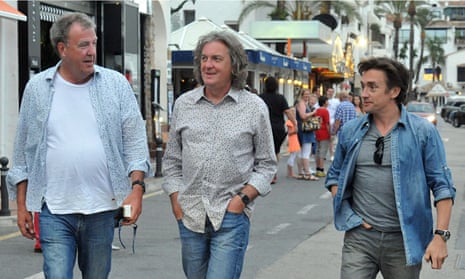Slope is a derogatory term used specifically to reference people of Vietnamese or Chinese descent in relation to their facial features, which originates from the Vietnam war era. Jeremy Clarkson’s use of the racial term to describe a local man in Thailand should never have been considered anything but offensive and was in total breach of broadcasting codes, as Ofcom concluded this week.
I was born in the UK and am of Vietnamese origin. I’ve experienced casual racism of this kind frequently. In central London I’ve been called a chink, people shout konichiwa and ni hao, others bow towards me, and I’ve even been complimented on my English accent. I would have been appalled had Ofcom not ruled Clarkson’s comments a breach of section 2.3 of the broadcasting code, which ensures that material that may cause offence is justified by the context. What we need to look at now is why the scriptwriters, producers and presenters didn’t question its use, not to mention why the BBC only received two complaints from viewers.
The episode in question featured a segment in which the three hosts – Richard Hammond, James May and Jeremy Clarkson look at a bridge they built on the River Kwai as a local man walks across it. Clarkson remarks: “That is a proud moment. But there’s a slope on it.” Co-presenter Richard Hammond, 44, replies: “You’re right, it’s definitely higher on that side.”
Slope isn’t used by east or south-east Asian people, it comes from a racist ideology and was chosen by a majority to define an ethnic minority. Imagine swapping this word with other racial terms; it wouldn’t even be considered. Why did the BBC ever think it was acceptable to use on a prime-time car show? According to Top Gear’s producer, Andy Wilman, it was: “A light-hearted wordplay joke referencing both the build quality of the bridge and the local Asian man who was crossing it.” Their defence – that BBC-employed scriptwriters weren’t aware the racial term slope could be seen as an offensive term – is extremely worrying.
The problem is exacerbated by the fact that strong voices from this ethnic minority group in Britain are almost completely absent from the mainstream media. Outspoken east and south-east Asian commenters are rare. The BBC says it “always strives to reflect the diversity of modern Britain through our output and across our workforce so that they better reflect our audiences”. Yet EastEnders – set in east London, which has a large east Asian community – has never featured an east or south-east Asian character apart from a female DVD seller, a role that lasted six months. When east and south-east Asian people are portrayed, we are almost never indigenous, and are often depicted as having thickly accented English. We are somehow not seen as part of a modern British society.
Last month, when student Bess Chan complained to the BBC over a lack of east Asian actors on television the broadcaster replied: “You’ll understand that the actor does have to reflect the character they portray and, yes, this includes things like ethnicity as well as wider considerations of age, gender, physical appearance and so on.” The subtext to this seems to be that we aren’t suitable to play everyday characters, only roles written directly for us.
That we are marginalised so much from mainstream media is one of the reasons Top Gear’s comments were approved and aired. East and south-east Asian people don’t have the numbers to mobilise themselves in the same way as south Asian or black people, and as a result, often go unheard. Growing up, I remember friends’ parents making jokes about Chinese food and people pulling their eyes and jumping towards me with karate kicks. Without any east Asian role models, I accepted this marginalisation and lack of representation as a part of life, and that it wasn’t as legitimately offensive as the abuse others receive. Perhaps this is a reason the BBC received so few complaints.
Clarkson’s brazen Twitter response after the original backlash reiterates how unlikely it is that the BBC will seriously reprimand him. The absence of an apology from the BBC and its dismissive attitude in the wake of the Ofcom report is disgraceful: “The programme apologised at the time and explained the context, and we are now focusing on delivering another series of one of Britain’s best loved shows.” This only highlights the lack of importance the corporation puts on serving Britons of my background.




